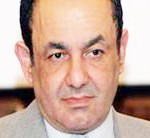The increasing trend of protests and sit-ins affecting Egypt’s governorates are analysed by some columnists, while others keep their attention focused on the challenges facing the draft constitution.
Fahmy Howeidi
We brought down the walls, but didn’t build bridges
Al-Shorouk newspaper
There were around 1400 strikes and demonstrations across Egypt in a span of 48 hours last week. Howeidi considers the escalating uproar of students, professionals and workers against the endless predicaments of their deteriorating living conditions. The increasing trend of sit-ins across the country compels the writer to examine the reasons for the contagious wrath infecting many segments of society. Egyptians have become more daring in voicing their demands but Howeidi surmises that the bridges connecting the community with authority remain burned.
After the 25 January revolution, the walls that used to detach ordinary Egyptians from the government collapsed. However, it seems that attempts to rebuild connections were unsuccessful. It is completely justifiable that a doctor would protest against his EGP 400 monthly salary that doesn’t even equate to the wage of an Asian maid in Egypt. Workers in numerous spheres all have valid arguments when they protest against corrupt work climates and their demeaning living conditions.
At a time when political parties are busy enough with their internal conflicts and workers’ syndicates are constantly being snubbed, the writer argues that more frustrations are likely to flare. Protesters should be excused, in Howeidi’s opinion. After long years of oppressing the demands of demonstrators, the writer asks whether the time has come to start effective dialogue between protesters and government officials?
Amr Hamzawy
Egypt’s constitution is not only an internal affair
Al-Watan newspaper
As Islamists strive to dominate the process of drafting Egypt’s new constitution, Hamzawy stresses the importance of establishing strong cooperative ties with international organisations to push for the creation of a more modern constitution that will hopefully respect democracy and human rights. As Egypt appears reputable in the international community for its commitment to numerous international treaties and agreements, many western governments are keeping an eye on developments relating to the constitution writing Hamzawy argues.
Therefore, it is the duty of almost all parties, political movements and civil society organisations to defend the state’s secularity and respect of personal freedoms in the forthcoming constitution. Hamzawy suggests that parties should start working closely with the United Nations Human Rights Council, the European Parliament and the Pan-African Parliament.
Liberal groups should call on such entities to support a non-theocratic political model in the constitution and encourage their governments to pressure the Muslim Brotherhood and other Islamist parties to respect human rights while writing this fundamental document. To conclude, Hamzawy affirms the necessity of liberal political groups across Egypt to increase public awareness on developments taking place behind the scenes of the Islamist-dominated Constituent Assembly.
Missing the alternative
Amr Al-Shobaki
Al-Masry Al-Youm newspaper
Secular political forces should realise that the Muslim Brotherhood was the most prepared alternative to Mubarak’s corrupt regime, argues Al-Shobaki. He condemns the division of liberal forces and their constant vilification to the Islamist group. Chanting “down with SCAF” and “down with the guidance bureau” will not, in Al-Shobaki’s opinion, create an effective challenge to the rising tide of political Islam. Designing an alternative demands maintaining an objective approach that doesn’t resort to the politics of personal attacks
However, barring ex-members of the ousted National Democratic Party reflects that political powers are choosing to focus on the individual rather than his previous association to an authoritarian political structure.
Personalising politics will result in a failing democratic process, even in newly-developed parties like the Hamdeen Sabah’s Public Coalition or Al-Dostor party. In Al-Shobaki’s view, liberal forces currently have a golden opportunity to create blocs against political Islam, but only if they can distance themselves from destructive criticism. Egypt’s biggest dilemma remains the old regime itself and not in the figures that used to operate within that regime. The Muslim brotherhood did not attract voters through their electoral violations alone, but indeed because their high organisational skills, so lacking in liberal parties.






